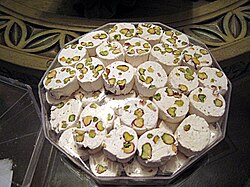
Summary
Gaz (Persian: گز) is an Iranian nougat that originated in the Isfahan region.[2] It is widely known as Persian Nougat in American and European countries.[3] It is made from pistachio, almond kernels, rose-water, egg whites and sap from Persian manna.[4][5]
 Gaz of Isfahan | |
| Type | Nougat |
|---|---|
| Place of origin | |
| Region or state | Isfahan |
| Main ingredients | sugar or corn syrup, pistachio or almond kernels, rosewater and egg whites[1] |
| |
Typically gaz is accompanied by tea or sherbet and is eaten as a dessert after a main course. It is also traditionally served on festive occasions such as Nowruz, the Persian New Year.[2]
Etymology edit
The Persian word Gaz is associated with gaz-angobīn which translates to 'Honey of Gaz', in reference to a species of Tamarisk, T. gallica[6] that is native to the Zagros mountain range located to the west of Isfahan. Gaz is traditionally presumed to be the sap of the Tamarisk tree.[3]
History edit
Gaz dates backs to 450 years ago in Isfahan, when the sap found on the Tamarisk tree was combined with flour, bread, pistachios, almonds and chocolate in traditional and industrial workshops.[citation needed] The height of this mountain tree reaches a height of two meters and it usually grows in good weather in the mountains of Bakhtiari and Khansar. The product of this tree becomes ready to harvest in the late summer and the shiny and yellow grains come out in the stems like millet. At this time, the owners of the trees must harvest them before the autumnal rains.[1]
The sweet, milky honey (angobīn) found on the Gaz plant is associated with manna, a food mentioned in the religious texts of the Abrahamic religions.
Manufacture and style edit
Although originally believed to be sap manufactured by the Tamarisk tree, the sticky white substance was found to be formed from honeydew, which is exuded from the anus of the nymph of a psyllid insect, either Cyamophila astragalicola[7] or C. dicora,[8] in its final instar, which live on plants of Astragalus adscendens,[7] and is collected annually and is combined with other ingredients including pistachio or almond kernels, rosewater and egg white. Modern versions of gaz may use sugar and corn syrup as substitutes for psyllid manna.[9][10]
The traditional way to serve gaz is in round pieces that are about 2 inches in diameter and up to ½ inch thick. A modern presentation is to serve the nougat cut into smaller rectangles.[3] Depending on the added ingredients, gaz can have a subtle rose flavour, a nutty taste, or a savoury and pungent profile, and it can be white, or another colour due to the addition of spices (such as saffron) or nuts.[3]
Nowruz edit
Celebrations such as Nowruz, the Persian New Year, feature gaz.[3] During the Nowruz holiday, family and friends visit each other's homes and, typically, the host offers fruits and sweets to their guests. Served with sherbet or tea, gaz is a favorite delicacy and a much-appreciated gift as it helps to ensure that a household will have ample snacks to serve all holiday visitors.[3]
See also edit
References edit
- ^ a b "Isfahan Gaz". rasekhoon.net. Archived from the original on 3 March 2019. Retrieved 30 April 2019.
- ^ a b "Iranian Gaz Recipe (Persian Nougat)". Travel Food Atlas. 19 April 2022. Retrieved 13 September 2022.
- ^ a b c d e f "Heavenly Persian Nougat". Candy Atlas. Retrieved 26 May 2020.
- ^ Mariana (4 December 2016). "15 Traditional Iranian Foods That Will Blow Your Mind". Rucksack Ramblings. Retrieved 13 September 2022.
- ^ ""Gaz" Candy, Traditional Souvenir of Iran's Isfahan". Iran Front Page (IFP News). 26 April 2022. Retrieved 13 September 2022.
- ^ Wulff, Hans, M.I.T. Press, 1966, The traditional crafts of Persia: their development, technology, and influence on Eastern and Western civilizations
- ^ a b Grami, Bahram (1998). "Gaz of Khunsar: The manna of persia". Economic Botany. 52 (2): 183–191. doi:10.1007/BF02861207. S2CID 40764712.
- ^ "Gaz (1)". Encyclopædia Iranica. 2000. Retrieved 4 January 2012.
- ^ "Persian Pistachio Nougat". thespruceeats.com. Retrieved 30 April 2019.
- ^ "Ciao samin: Gaz: Persian Nougat". Samin Nosrat. Archived from the original on 10 May 2013. Retrieved 5 January 2012.


